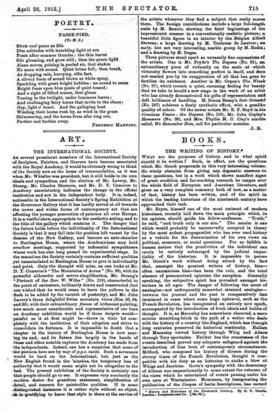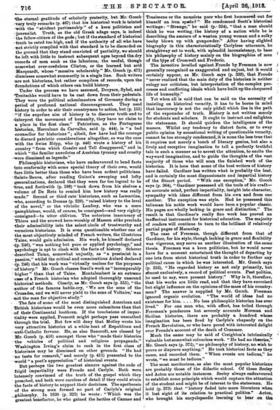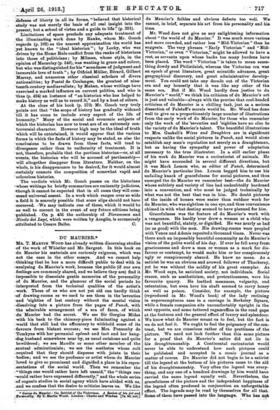BOOKS.
THE WRITING OF HISTORY.*
WHAT are the purposes of history, and in what spirit should it be written ? Such, in effect, are the questions which Mr. Gooch propounds in this very interesting volume. He wisely abstains from giving any dogmatic answers to- these questions, but in a work which shows manifest signs of great erudition and far-reaching research be ranges over the whole field of European and American literature, and. gives us a very complete summary both of how, as a matter of fact, history has been written, and of the spirit in which the leading historians of the nineteenth century have approached their task.
Mr. Bryce, himself one of the most eminent of modern historians, recently laid down the main principle which, in his opinion, should guide his fellow-craftsmen. "Truth,' he said, "and truth only is our aim." The maxim is one which would probably be unreservedly accepted in theory by the most ardent propagandist who has ever used history as a vehicle for the dissemination of his own views on political, economic, or social questions. For so fallible is human nature that the proclivities of the individual can rarely be entirely submerged by the judicial irupar- tiality of the historian. It is impossible to peruse- Mr. Gooch's work without being struck by the fact that, amongst the greatest writers of history, bias— often unconscious bias—has been the rule, and the total absence of preconceived opinions the exception. Generally speaking, the subjective spirit has prevailed amongst his- torians in all ages. The danger of following the scent of analogies—not unfrequently somewhat strained analogies— between the present and the past is comparatively less imminent in cases where some huge upheaval, such as- the- French Revolution, has inaugurated an entirely new epoch,. accompanied by the introduction of fresh ideals and habits of thought. It is, as Macaulay has somewhere observed, a more- serious stumbling-block in the path of a writer who deals with the history of a country like England, which has through long centuries preserved its historical continuity. Hallam and Macaulay viewed history through Whig and Alison through Tory spectacles. Neither has the remoteness of the events described proved any adequate safeguard against the introduction of bias born of contemporary circumstances. Mitford, who composed his history of Greece during the stormy times of the French Revolution, thought it com- patible with his duty as an historian to strike a blow at Whigs and Jacobins. Grote's sympathy with the democracy of Athens was unquestionably to some extent the outcome of the views which be entertained of events passing under his own eyes at Westminster. Mom msen, by inaugurating the publication of the Corpus of Latin Inscriptions, has earned
• History and Historians of the Nmeteenth Century. By 0. F. Gooch. London Longmans and Co. [10s.
'the eternal gratitude of scholarly posterity, but Mr. Gooch -very truly remarks (p. 467) that his historical work is tainted
-with the "strident partisanship" of a keen politician and
journalist. Truth, as the old Greek adage says, is indeed the fellow-citizen of the gods ; but if the standard of historical truth be rated too high, and if the authority of all who have not strictly complied with that standard is to be discarded on the ground that they stand convicted of partiality, we should te left with little to instruct subsequent ages beyond the dry records of men such as the ]aborious, the useful, though somewhat over-credulous Clinton, or the learned but arid Marquardt, whose "massive scholarship" Mr. Gooch (p. 471) dismisses somewhat summarily in a single line. Such writers are not historians, but rather compilers of records, upon the foundations of which others can build history.
Under the process we have assumed, Droysen, Sybel, and 'Treitschke would have to be cast down from their pedestals. They were the political schoolmasters of Germany during a period of profound national discouragement. They used history in order to stir their countrymen to action, but (p. 155) "if the supreme aim of history is to discover truth and to =interpret the movement of humanity, they have no claim to a place in the first class." Patriotism, as the Portuguese historian, Hercula.no da Carvalho, said (p. 444), is "a bad counsellor for historians "; albeit, few have had the courage to discard patriotic considerations altogether, as was the case with the Swiss Hopp, who (p. 446) wrote a history of his country "from which Gessler and Tell disappeared," and in which "the familar anecdotes of Austrian tyranny and cruelty -were dismissed as legends."
Philosophic historians, who have endeavoured to bend facts -into conformity with some special theory of their own, would -fare little better than those who have been ardent politicians.
• Sainte-Benve, after reading Guizot's sweeping and lofty generalizations, declared that they were far too logical to be true, and forthwith (p. 189) "took down from his shelves a volume of De Betz to remind him bow history was really made." Second or third rate historians, such as Lamartine, -who, according to Dumas (p. 228), "raised history to the level of the novel," or the vitriolic Lanfrey, who was a mere -pamphleteer, would, of course, be consigned—and very rightly .consigned—to utter oblivion. The notorious inaccuracy of Thiers and the avowed hero-worship of Masson alike preclude -their admissibility into the select circle of trustworthy and -veracious historians. It is even questionable whether one of the most objectively minded of French writers, the illustrious Taine, would gain admission. His work, he himself declared 246), "was nothing but pure or applied psychology," and psychology is apt to clash with the facts of history. Scherer • -described Taine, somewhat unjustly, as "a pessimist in a passion," whilst the critical and conscientious Aulard declared - s(p. 246) that his work was "virtually useless for the purposes --of history." Mr. Gooch classes Socel's work as "incomparably 'higher" than that of Taine. ldontalembert is an extreme .case of a French historian who adopted thoroughly unsound historical methods. Clearly, as Mr. Gooch says (p. 555), "the author of the famous battle.cry, We are the sons of the Crusades, and we will never yield to the sons of Voltaire,' was vot the man for objective study."
The fate of some of the most distinguished American and British historians would be even more calamitous than that -of their Continental brethren. If the touchstone of impar- tiality were applied, Prescott might perhaps pass unscathed through the trial. But few will deny that Motley wrote his -very attractive histories at a white heat of Republican and anti-Catholic fervour. He, as also Bancroft, are classed by Mr. Gooch (p. 416) amongst those who "made their histories -the vehicles of political and religious propaganda." Washington Irving's claim to rank in the first class of historians may be dismissed on other grounds. "He had -no taste for research," and merely (p. 411) presented to the
"a poet's appreciation" of historical events.
But perhaps the two greatest sinners against the code of frigid impartiality were Froude and Carlyle. Both were intensely convinced of the truth of the gospel which they preached, and both were careless of detail if they could strain -the facts of history to support their doctrines. The apotheosis of the strong man formed no part of Carlyle's original _philosophy. In 1830 (p. 323) he wrote : "Which was the greatest beiaefactor, he who gained the battles of Cannae and Trasimeno or the nameless poor who first hammered out for himself an iron spade?" He condemned Scott's historical writings : "Strange," he said (p.- 324), "that a man should think he was writing, the history of a nation while he is describing the amours of a wanton young woman and a sulky booby blown up with gunpowder." After baying slighted biography in this characteristically Carlylese utterance, he straightway set to work, with splendid inconsistency, to base his philosophy of history mainly on the biographies of men of the type of Cromwell and Frederic.
The invective levelled against Froude by Freeman is now generally recognized as exaggerated and unjust, but it would certainly appear, as Mr. Gooch says (p. 339), that Froude "never realized that the main duty of the historian is neither eulogy nor criticism, but interpretation of the complex pro- cesses and conflicting ideals which have built up the chequered life of humanity."
Yet when all is said that can be said on the necessity of insisting on historical veracity, it has to be borne in mind that inaccuracy is not the only pitfall which lies in the path of the expounder of truth. History is not written merely for students and scholars. It ought to instruct and enlighten the statesman. It should quicken the intelligence of the masses. Whilst any tendency to distort facts, or to sway public opinion by sensational writing of questionable veracity, cannot be too strongly condemned, it is none the less true that it requires not merely a touch of literary genius, but also a lively and receptive imagination to tell a perfectly truthful
tale in such a manner as to arrest the attention, to excite the wayward imagination, and to guide the thoughts of the vast majority of those who will scan the finished work of the historian. It is here that some of the best writers of history have failed. Gardiner has -written what is probably the best, and is certainly the most dispassionate and impartial history of the Stuart period. "With one exception," Mr. Gooch says (p. 364), "Gardiner possessed all the tools of his craft— an accurate mind, perfect impartiality, insight into character, sympathy with ideas different from his own and from one another. The exception was style. Had he possessed this talisman his noble work would have been a popular classic. His pages are wholly lacking in grace and distinction." The result is that Gardiner's really fine work has proved an ineffectual instrument for historical education. The majority of readers will continue to turn to the brilliant if relatively partial pages of Macaulay.
The case of Freeman, though different from that of Gardiner, for his style, though lacking in grace and flexibility was vigorous, may serve as another illustration of the same thesis. Freeman was a keen politician, but he would never have for a moment entertained the thought of departing by one iota from strict historical truth in order to further any political cause in which he was interested. Mr. Gooch says (p. 352), "He regarded history as not only primarily, but aimost exclusively, a record of political events. Past politics, he used to say, were present history." Why is it, therefore, that his works are little read, and that they have exercised but slight influence on the opinions of the mass of his country- men? The answer is supplied by Mr. Goach. Freeman ignored organic evolution. "The world of ideas had no existence for him. . . . No less philosophic historian has ever lived." For one man who, with effort, has toiled through Freeman's ponderous but severely accurate Norman and Sicilian histories, there are probably a hundred whose imagination has been fired by Carlyle's rhapsody on the French Revolution, or who have pored with interested delight over Froude's account of the death of Cranmer.
Much the same may be said of Creighton's intrinsically valuable but somewhat colourless work. "He had no theories," Mr. Gooch says (p. 372)," no philosophy of history, no wish to prove or disprove anything." He took historical facts as they came, and recorded them. "When events are tedious," he wrote, "we must be tedious."
The most meritorious, as also the most popular historians are probably those of the didactic school. Of these Seeley and Acton are notable instances. Seeley always endeavoured. to establish some principle which would capture the attention of the student and might be of interest to the statesman. He held (p. 373) that "history faded into mere literature when it lost sight of its relation to practical politics." .Acton, who brought his encyclopaedic learning to bear on the
Zefence of liberty in all its forms, "believed that historical study was not merely the basis of all real insight into the present, but a school of virtue and a guide to life" (p. 391).
Limitations of space preclude any adequate treatment of the illuminating work done by Henke, whom Mr. Gooch regards (p. 102) as the nearest approximation the world has yet known to the "ideal historian"; by Lecky, who was driven by the Home Rule conflict from the ranks of historians into those of, politicians ; by Millman, whose style, in the opinion of Macaulay (p. 546), was wanting in grace and colour, but who was distinguished for his "soundness of judgment and inexorable love of truth "; by °dried Muller, Berard, Gilbert Murray, and numerous other classical scholars of divers nationalities; by nista de Coulanges, the greatest of nine- teenth-century mediaevalists; by Mahan, whose writings have exercised a marked influence on current politics, and who is 'thus (p. 424) an instance of "an historian who has 'helped to make history as well as to record it," and by a host of others.
At the close of his book (p. 573) Mr. Gooch very truly points out that "the scope of history has gradually widened till it has come to include every aspect of the life of humanity." Many of the social and economic subjects of which the historian has now to treat are of an extremely con- troversial character. However high may be the ideal of truth -which will be entertained, it would appear that the various forms in which the facts of history may be stated, as also the conclusions to be drawn from these facts, will tend to divergence rather than to uniformity of treatment. It is • not, therefore, probable that the partisan historian—or, at all events, the historian who will be accused of partisanship— will altogether disappear from literature. Neither, on the -whole, is his disappearance to be desired, for it would almost certainly connote the composition of somewhat vapid and colourless histories.
The verdicts which Mr. Gooch passes on the historians -whose writings he briefly summarizes are eminently judicious, 'though it cannot be expected that. in all cases they will com- mand universal assent. In a work which ranges over so wide • a field it is scarcely possible that some slips should not have -occurred. .We may indicate one of these, which it would be as well to correct in the event of any future editions being 'published. On p. 435 the authorship of Fieramosca and • Nicol(' dei Lapi, which were written by Azeglio, is erroneously




























































 Previous page
Previous page